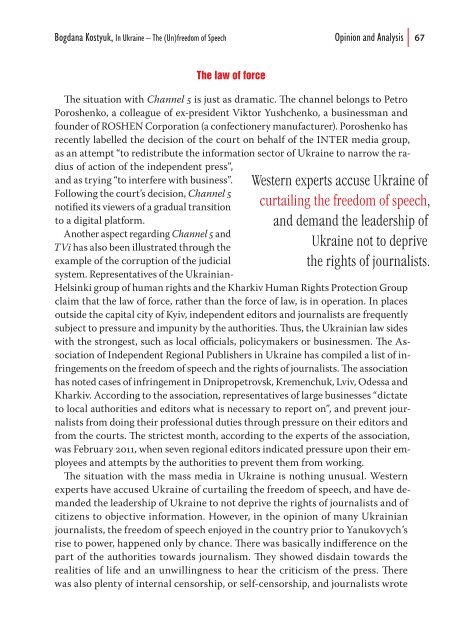Create successful ePaper yourself
Turn your PDF publications into a flip-book with our unique Google optimized e-Paper software.
Bogdana Kostyuk, In Ukraine – The (Un)freedom of Speech Opinion and Analysis 67<br />
The law of force<br />
Th e situation with Channel 5 is just as dramatic. Th e channel belongs to Petro<br />
Poroshenko, a colleague of ex-president Viktor Yushchenko, a businessman and<br />
founder of ROSHEN Corporation (a confectionery manufacturer). Poroshenko has<br />
recently labelled the decision of the court on behalf of the INTER media group,<br />
as an attempt “to redistribute the information sector of Ukraine to narrow the radius<br />
of action of the independent press”,<br />
Western experts accuse Ukraine of<br />
curtailing the freedom of speech,<br />
and demand the leadership of<br />
Ukraine not to deprive<br />
the rights of journalists.<br />
and as trying “to interfere with business”.<br />
Following the court’s decision, Channel 5<br />
notifi ed its viewers of a gradual transition<br />
to a digital platform.<br />
Another aspect regarding Channel 5 and<br />
TVi has also been illustrated through the<br />
example of the corruption of the judicial<br />
system. Representatives of the Ukrainian-<br />
Helsinki group of human rights and the Kharkiv Human Rights Protection Group<br />
claim that the law of force, rather than the force of law, is in operation. In places<br />
outside the capital city of Kyiv, independent editors and journalists are frequently<br />
subject to pressure and impunity by the authorities. Th us, the Ukrainian law sides<br />
with the strongest, such as local offi cials, policymakers or businessmen. Th e Association<br />
of Independent Regional Publishers in Ukraine has compiled a list of infringements<br />
on the freedom of speech and the rights of journalists. Th e association<br />
has noted cases of infringement in Dnipropetrovsk, Kremenchuk, Lviv, Odessa and<br />
Kharkiv. According to the association, representatives of large businesses “dictate<br />
to local authorities and editors what is necessary to report on”, and prevent journalists<br />
from doing their professional duties through pressure on their editors and<br />
from the courts. Th e strictest month, according to the experts of the association,<br />
was February 2011, when seven regional editors indicated pressure upon their employees<br />
and attempts by the authorities to prevent them from working.<br />
Th e situation with the mass media in Ukraine is nothing unusual. Western<br />
experts have accused Ukraine of curtailing the freedom of speech, and have demanded<br />
the leadership of Ukraine to not deprive the rights of journalists and of<br />
citizens to objective information. However, in the opinion of many Ukrainian<br />
journalists, the freedom of speech enjoyed in the country prior to Yanukovych’s<br />
rise to power, happened only by chance. Th ere was basically indiff erence on the<br />
part of the authorities towards journalism. Th ey showed disdain towards the<br />
realities of life and an unwillingness to hear the criticism of the press. Th ere<br />
was also plenty of internal censorship, or self-censorship, and journalists wrote



